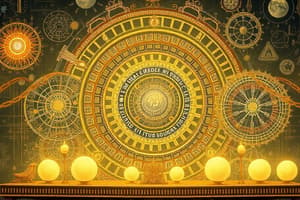Podcast
Questions and Answers
What does the second law of thermodynamics state?
What does the second law of thermodynamics state?
- Entropy tends to decrease in spontaneous processes.
- Entropy tends to increase in spontaneous processes. (correct)
- Energy conservation involves work done and heat out.
- Entropy is constant at absolute zero.
Kinematics focuses on the study of motion and the effects of forces on that motion.
Kinematics focuses on the study of motion and the effects of forces on that motion.
False (B)
What is the formula that describes Newton's second law of motion?
What is the formula that describes Newton's second law of motion?
F = ma
The phenomenon of light bending as it passes through a lens is known as __________.
The phenomenon of light bending as it passes through a lens is known as __________.
Match the following concepts in physics with their definitions:
Match the following concepts in physics with their definitions:
Which of the following is a type of electromagnetic wave?
Which of the following is a type of electromagnetic wave?
In a series circuit, the total current is the same at all points.
In a series circuit, the total current is the same at all points.
Name one application of nuclear physics.
Name one application of nuclear physics.
Flashcards are hidden until you start studying
Study Notes
Key Concepts in Physics
1. Mechanics
- Kinematics: Study of motion (displacement, velocity, acceleration).
- Dynamics: Forces and their effects on motion (Newton's laws of motion).
- Work and Energy: Work done by forces; kinetic and potential energy; conservation of energy principle.
- Momentum: Product of mass and velocity; conservation of momentum in closed systems.
2. Thermodynamics
- Temperature and Heat: Measurement of thermal energy; heat transfer methods (conduction, convection, radiation).
- Laws of Thermodynamics:
- First Law: Energy conservation (energy in = work done + heat out).
- Second Law: Entropy and the direction of spontaneous processes.
- Third Law: Absolute zero and entropy.
3. Waves and Oscillations
- Wave Properties: Wavelength, frequency, amplitude, speed.
- Types of Waves: Mechanical (sound) and electromagnetic (light).
- Superposition Principle: Interference of waves and formation of standing waves.
4. Electricity and Magnetism
- Electric Charge: Fundamental property; laws of electrostatics (Coulomb's law).
- Electric Fields and Potential: Concept of field lines; potential difference and voltage.
- Current and Circuits: Ohm's law, series and parallel circuits, and power in electrical systems.
- Magnetism: Magnetic fields; electromagnetic induction (Faraday's law).
5. Modern Physics
- Relativity: Einstein's theory; impact of speed on time and space (time dilation, length contraction).
- Quantum Mechanics: Particle-wave duality; uncertainty principle; quantum states and superposition.
- Atomic Structure: Protons, neutrons, electrons; atomic models (Bohr model, quantum mechanical model).
6. Additional Topics
- Optics: Behavior of light; reflection, refraction, lenses, and optical instruments.
- Nuclear Physics: Radioactivity; fission and fusion; applications in energy and medicine.
- Astrophysics: Study of stars, galaxies, and cosmological phenomena.
Fundamental Laws
- Newton's Laws of Motion:
- An object remains at rest or in uniform motion unless acted on by a force.
- Force equals mass times acceleration (F=ma).
- For every action, there is an equal and opposite reaction.
- Conservation Laws: Energy, momentum, and charge are conserved in isolated systems.
Units of Measurement
- SI Units:
- Length: meter (m)
- Mass: kilogram (kg)
- Time: second (s)
- Force: Newton (N)
- Energy: Joule (J)
- Charge: Coulomb (C)
Problem-Solving Strategies
- Identify known and unknown variables.
- Apply relevant equations based on concepts involved.
- Check units and dimensions for consistency.
- Analyze results for physical plausibility.
Key Concepts in Physics
Mechanics
- Kinematics: Analyzes motion involving displacement, velocity, and acceleration.
- Dynamics: Focuses on forces acting on objects as described by Newton's laws of motion.
- Work and Energy: Accounts for work done by forces, differentiates between kinetic and potential energy, and outlines the conservation of energy principle.
- Momentum: Defined as the product of mass and velocity; obeys the conservation principle in closed systems.
Thermodynamics
- Temperature and Heat: Quantifies thermal energy and identifies heat transfer methods: conduction, convection, and radiation.
- Laws of Thermodynamics:
- First Law: States that energy is conserved (input energy equals work done plus heat transferred out).
- Second Law: Introduces entropy, dictating the direction of spontaneous processes.
- Third Law: Relates to absolute zero, which signifies minimum entropy.
Waves and Oscillations
- Wave Properties: Essential characteristics include wavelength, frequency, amplitude, and speed.
- Types of Waves: Divided into mechanical waves (like sound) and electromagnetic waves (such as light).
- Superposition Principle: Describes how waves interfere, resulting in patterns like standing waves.
Electricity and Magnetism
- Electric Charge: A fundamental characteristic; governed by electrostatic laws, particularly Coulomb's law.
- Electric Fields and Potential: Visualized through field lines; potential difference defines voltage.
- Current and Circuits: Governed by Ohm's law; key concepts include series and parallel circuits along with electrical power.
- Magnetism: Engages with magnetic fields and the principles of electromagnetic induction, notably Faraday's law.
Modern Physics
- Relativity: Explores Einstein’s theories, which detail how speed affects time (time dilation) and space (length contraction).
- Quantum Mechanics: Discusses particle-wave duality, the uncertainty principle, and the concept of quantum superposition.
- Atomic Structure: Comprises protons, neutrons, and electrons along with models such as the Bohr model and quantum mechanical model.
Additional Topics
- Optics: Studies the behavior of light through phenomena like reflection, refraction, lenses, and optical devices.
- Nuclear Physics: Investigates radioactivity, fission, fusion, and their applications in energy generation and medicine.
- Astrophysics: Examines celestial bodies, galaxies, and large-scale cosmological phenomena.
Fundamental Laws
- Newton's Laws of Motion:
- An object will stay in motion or at rest unless acted upon.
- Force is the product of mass and acceleration (F=ma).
- Every action has an equal and opposite reaction.
- Conservation Laws: Energy, momentum, and electric charge are conserved in isolated systems.
Units of Measurement
- SI Units:
- Length: meter (m)
- Mass: kilogram (kg)
- Time: second (s)
- Force: Newton (N)
- Energy: Joule (J)
- Charge: Coulomb (C)
Problem-Solving Strategies
- Identify known and unknown variables to frame the problem.
- Apply relevant equations reflecting the concepts involved.
- Ensure units and dimensions are consistent across calculations.
- Evaluate results for physical feasibility and coherence.
Studying That Suits You
Use AI to generate personalized quizzes and flashcards to suit your learning preferences.



